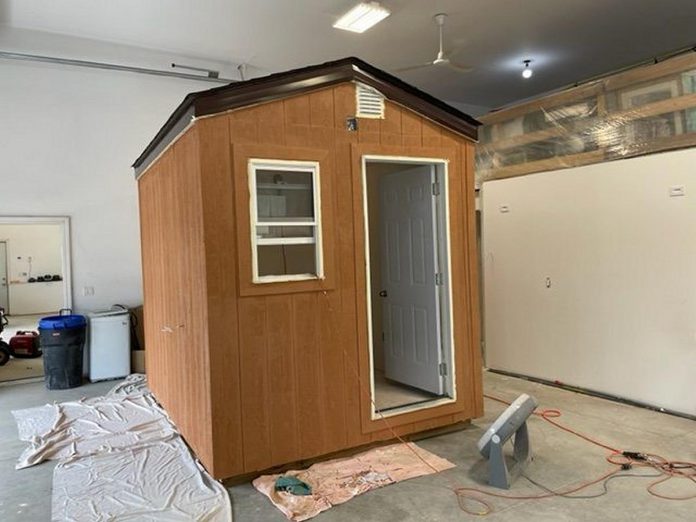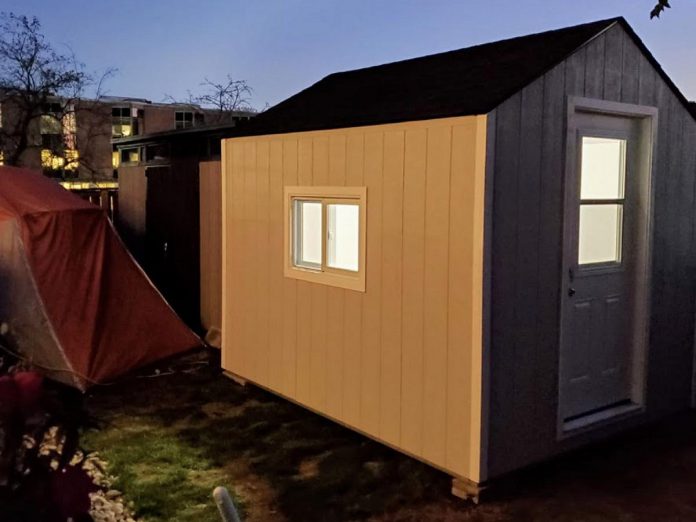
A grassroots initiative to build a village of 50 “tiny homes” for homeless people in Peterborough is one step closer to reality.
Peterborough Action for Tiny Homes (PATH) will unveil its first “tiny home” — a sleeping cabin with a lockable door — at 1 p.m. on Saturday (August 27) at Grace United Church at 581 Howden Street in Peterborough.
Members of the public are invited to join the launch celebration, which will include a tour of the model cabin along with live music from Paul Cragg and others, poetry, and home-baked treats.
Chris Cleary of Cleary Homes, who built the cabin with a volunteer construction crew headed by Ross Allen of Grace United Church, will be at the celebration along with Allen.
Drew Merrett of Merrett Home Hardware supplied materials for the cabin at cost along with Ken Wood at Charlotte Paint and Wallpaper. In partnership with PATH, Grace United Church raised $10,000 in a fundraising initiative spearheaded by church member Bev Templar.
“I’ve always been passionate about helping to solve homelessness,” says Templar in a media release.

At the launch celebration, retired priest Father Leo Coughlin and PATH steering committee member Marie Howran will present the group’s vision: a cluster of brightly painted cabins, within secure fencing with attractive murals, to be up and running for the winter, when PATH hopes to house 15 people experiencing homelessness.
That initial cluster will be based on a campground model, with auxiliary outbuildings including washroom and shower facilities (while the cabins will have electricity for lighting and heating, they will not have indoor plumbing). The group’s ultimate vision is a village of 50 self-sufficient tiny homes.
PATH has also committed to finding wraparound services to support the village, including trauma-informed care and the offer of employment in social enterprises.
“All social services costs drop when people have a home for shelter,” says Dave Sumner, who helped build the first cabin and helps administer PATH’s public Facebook group. “Police calls are reduced. Medical emergency calls are reduced. Fire and police services are not required to displace unwanted tent communities. Fear and concern among businesses and downtown shoppers are reduced. Putting vulnerable people into housing is a low-cost solution with every imagined advantage. This is a win, that our city leaders can brag about.”
The idea of using sleeping cabins to alleviate homelessness as an alternative to traditional shelters and tents in public spaces is not new. Tiny homes provide people with a roof over the heads, a door they can lock, and a sense of safety — all of which advocates say are essential to transition out of homelessness. Many U.S. states have already turned to tiny home and, in Ontario, the cities of Kingston and Kitchener have both implemented tiny home projects.
In Kingston, a group called Our Livable Solutions created a sleeping cabin community at Portsmouth Olympic Harbour as a pilot project initially funded by $257,000 from the province’s pandemic social services relief fund and a $150,000 private donation. The cabins in the Kingston project are fully insulated and wired with four 20-amp receptacles, an indoor light, an outdoor light, a heater, an air exchanger, and a tamper-proof smoke and CO2 detector. The community has shared bathrooms and showers, which the residents assist in keeping clean.

In Kitchener, the “A Better Tent City” project consists of a row of 24 insulated cabins and an indoor warming space, garbage and recycling, kitchen, washrooms, showers, and laundry. Activist Tony D’Amato Stortz, who worked at A Better Tent City for more than a year, recently published a book called A Home of Their Own: A Guide to Building a Tiny Homes Community.
For those unable to attend PATH’s August 27th launch event at Grace United Church, the model sleeping cabin will remain on display at the church until September 3. After that, the cabin will be “roving” around Peterborough: it will be at Cathedral of St. Peter-in-Chains at 411 Reid Street from September 3 to 10, at Emmanuel United Church at 534 George Street North from September 10 to 17, and at the Purple Onion Festival in Millennium Park on September 25 (update: the Purple Onion Festival has now been cancelled).
At these locations, members of the public can take a look at the cabin and ask questions of volunteers, including some people who have been (or are currently) unhoused.
“People are invited to sign up for shifts at the cabin or to volunteer for the many needs of this amazing grassroots project,” says Charlene Avon, the coordinator of the roving cabin tour. “Everyone needs a place to sleep, and we can be part of the solution.”
To help support PATH’s tiny homes initiative for Peterborough, you can donate at the August 27th launch event at Grace United Church. The church is also challenging other faith groups, businesses, and individuals to raise funds to build additional sleeping cabins for the project.
For more information, email pathadm22@gmail.com or call Charlene Avon at 705-761-4408.


























